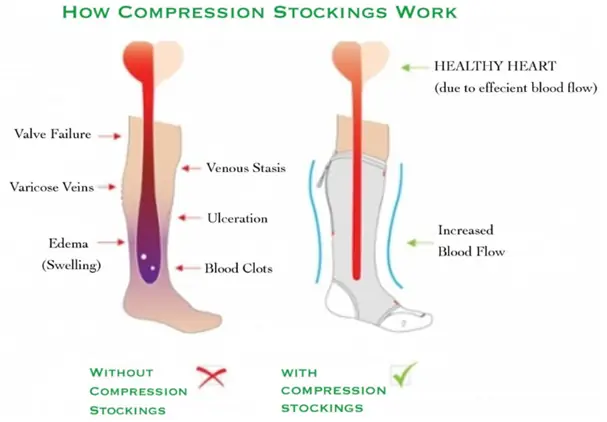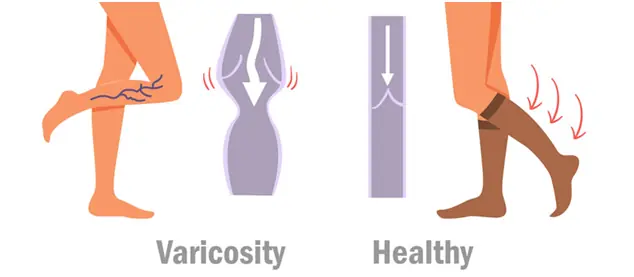Nurses who wear compression socks have a lot to be thankful for. The fact of the matter is, that nurses are at risk of developing blood clots in their legs, which can lead to life-threatening complications.
Compression socks can help prevent this by reducing blood flow and pressure. Nurses should also consider wearing them when they are on their feet all day, as this will help reduce the risk of developing varicose veins.
This article will explore how compression stockings are beneficial for nurses, as well as how they can help improve their professional lives by helping them recover from long shifts or work in stressful environments.

What Do Compression Socks Do For Nurses?
When it comes to preventing DVT and varicose veins, there are multiple medical reasons why nurses should wear compression socks.
Compression stockings are also worn as a way to prevent problems caused by work stress. Stress can cause fatigue, headaches, back pain, and insomnia. It also causes anxiety and depression.
With all these symptoms of stress in mind (and more), it is important that you make sure that, being a nurse, your body has enough rest so that you can stay healthy at work and home!
What Are the Benefits of Compression Socks for Nurses?
Compression socks help improve circulation

Compression socks help improve circulation. The key to this is blood flow, which is made possible through the use of them.
These stockings work by squeezing your legs against each other, creating pressure on the veins and arteries in your legs, which leads to increased blood flow. This can help prevent varicose veins from forming as well as swelling in other areas like your feet or ankles due to increased pressure on those areas.
Read More: Benefits of Compression Socks
Compression socks can help prevent DVT in nurses
A DVT is a blood clot in the veins of the lower leg. It can be caused by sitting for long periods of time, particularly if you’re nursing or pregnant, and it’s more likely to occur during travel or bedrest (like when you’re resting after surgery).
When this happens, there will be pain and swelling as well as shortness of breath—and if left untreated, it could lead to more serious complications such as pulmonary embolism (PE), which is when part of a clot travels into your lungs causing them damage or blockage. PE threatens all kinds of things: heart failure; lung problems like pneumonia; even death!
Nurses are especially at risk because they spend long hours on their feet working with patients every day—so wearing compression socks for swelling gives us added protection against DVT while we do so!
Compression socks can help prevent varicose veins

Varicose veins are common problems for nurses, especially those who are on their feet all day.
These varicose veins can be painful and unsightly, so it’s important to choose compression socks that are specific for varicose veins. These stockings can help prevent this issue by supporting the legs and keeping them firm and bulked up against gravity.
Varicose veins are caused by blood pooling in the legs because of pressure on the vein walls from standing or sitting too long with your feet flat on the floor (or desk).
It’s important to keep your muscles strong so that you don’t get swollen ankles or feet when walking around all day long!
Under-compression socks are more comfortable to wear
Compression socks are more comfortable to wear than regular socks because they breathe better and are less restrictive. They also make it easier to put on and take off, as well as make you look cooler when you’re wearing them!
Also Read Our Reviews:
How Do You Keep Compression Socks Clean in a Hospital Environment?
This is a question that comes up frequently in the hospital. It’s important to keep your socks clean because they can lead to bacterial growth, which can lead to infections and other problems.
There are a few ways you can keep your stockings clean:
- Don’t wear them for long periods of time. This means don’t wear them overnight, or all day at work if you’re on your feet all day.
- Don’t wear them for too many days in a row (at least two days). You should change socks every two days or so so that there’s always something new and fresh coming into contact with your skin.
- Wash them in warm water with detergent and a mild soap every time you wash them (or every week, if possible). Make sure you rinse out any soap residue well!
- Pop them into the dryer on low heat when they are dry for about 15 minutes if possible (don’t use the high heat setting!).
If you want a complete guide, check out here how to wash compression socks to use them without being worried!
FAQs – Get more answers here!
We recommend that you wear your compression socks for no more than 8 hours in a 24-hour period unless directed by your doctor.
Wearing compression socks for more than 8 hours at a time can cause irritation or inflammation of the skin, which could potentially lead to problems with circulation or blood flow in your legs or feet.
If you think you might be experiencing any of these symptoms, we recommend stopping wearing the stockings immediately and seeking medical attention from a doctor who is familiar with your condition.
What should I know before using compression socks as a nurse?
There are a lot of factors you should consider before deciding to use compression socks as a nurse.
First, you should make sure that your socks are made from high-quality materials. You want them to be durable and long-lasting.
Second, you should make sure that the socks fit properly. If they’re too large or too small, then they won’t be effective at keeping your swelling down.
And third, you should think about how comfortable they are going to be. You don’t want to end up with sore feet while wearing them!
Conclusion
Compression socks have a lot of benefits. They can help prevent blood clots, and improve circulation, and they can even reduce swelling in your feet or legs. There are many things that you will want to ask a nurse about when it comes to their decision on whether or not they should wear compression socks while working.


